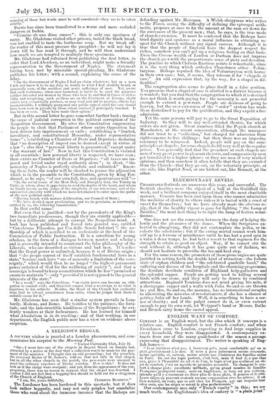A RELIGIOUS BEGGAR.
A COUNTRY visitor is puzzled at a London phmnomenon, and com- municates his surprise to the Morning Post.
"United University Club, July 21. "Sir—I went into one of the chapels in Regent Street on Sunday last, attracted by a notice at the door that a collection was to be made for the pay- ment of the minister. I thought this an odd proceeding; but the preacher, the reverend Rector of St. James's, told us, that not only in that chapel, but in all the other chapels in the parish, the pew-rents were unequal to meet the ordinary expenses of Divine worship. How is this ? It does not look as if the clergy were overpaid; and yet, from the appearance of the con- gregation, there was no reason to suppose that the chapel was deserted. I confess I did not feel that a begging-box should be held out for a clergyman of the Church of England. "I am, Sir, yours faithfully, CLERICIR3 Rumens."
The Londoner has been hardened to this spectacle, but it does leek rather beggarly, and may not only perplex but scandalize those who read about the immense• incomes that the Bishops axe defending against Mr. Horsman. A Welsh clergyman who writes to the Times, seeing the difficulty of defining the episcopal arith- metic, proposes at once to fix the amount at the sum set down for the successors of the present men ; that, he says is the true mode of church-extension. It must be confessed that the Bishops have tried dignity and opulence as a moral influence in obtaining re- spect for the Church without any signal success. Although it is true that the people of England have the deepest respect for riches, somehow you can't get up a religious feeling on that basis. Even the Crcesus wealth of London or Durham does not impress the church-g,or with the proportionate sense of piety and devotion. The practice to which Clericus Rusticus points is remarkable, since it is the very thing which orthodox Churchmen abhor—Volun- , taryism. Bishops repulsed the idea of Voluntaryism with horror , in their own case ; but, it seems, they tolerate it for "chapels of I ease." An odd expression that, by the way, for a chapel in dif- ficulties!
The congregation also seems to place itself in a false position. i You presume that a chapel of ease s allotted to a district because it is wanted ; but you find that the congregation to which it is destined does not think it worth paying for : the necessity is not powerful enough to extract a pew-rent. People are desirous of going to heaven, but the over-extension of the "order " system has made them disinclined to pay for the gratification, and they expeZt a free admission.
Yet the same persons will pay to go to the Great Exposition of Industry. So they will to any well-attended theatre, for which orders are not given. Great numbers filled the Popish church at Manchester, at the recent consecration, although the managers did not trust to a "collection," but charged for admission from eighteenpence to five shillings; but then there was an imposing ceremony to be witnessed. Indeed, people will pay on the same principles at chapels; for some chapels do fill very well at the regular prices. You generally find that the preachers at such chapels are men of very great power in pleasant rhetoric, and comparatively soon get translated to a higher sphere ; or they are men of very marked opinions, and then somehow it often befalls that they are extruded from the Church—that they go out, on the voluntary principle, at one side, like Baptist Noel, or are kicked out, like Bennett, at the other.


























 Previous page
Previous page